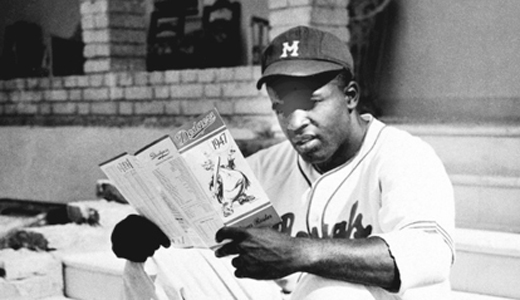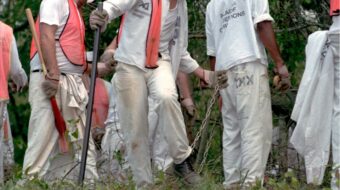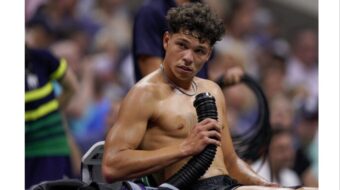
The following is a letter from the daughter of Jackie Robinson sent out by the White House about her visit with the President and First Lady to Cuba. But it’s also about so much more. Robinson, a giant in baseball history, broke down Jim Crow segregation in Major League Baseball. He did not do it alone, as the letter points out, but with a movement for civil rights. People’s World predecessor, the Daily Worker, was part of that movement and is widely credited as a champion of the cause to break baseball’s color line. However, the letter is not just about the past but about the future as well. The future of U.S. – Cuba relations, a cause that People’s World has been involved in as well. The cause — to normalize relations and to end the economic embargo, which has unjustly hurt Cuba and the American people – is only partly achieved. The embargo remains in place today because Congress needs to act to end it. The form that U.S. – Cuba relations will take depends much upon the agency of the U.S. public to elect a Congress and President that will respect Cuba’s sovereignty and work to have “good neighbor” relations with the socialist island. And yes, baseball can play a role in forming good relations and ending this remnant of U.S. Cold War destructive policies. It’s Opening Day for baseball and it’s opening day for a just policy toward Cuba.
Today is Opening Day — a day that brings back a lot of memories of my father Jackie Robinson.
They are memories that my mother and I carried with us when, last week, President Obama and First Lady Michelle Obama invited us to join them on a trip to Havana, Cuba. It was an experience of a lifetime. We were thrilled and honored to be in their company and to witness our President extend the hand of friendship to the Cuban people.
Our 48-hour itinerary took us through Old Havana, to a State dinner at the Palace of the Revolution, and to the El Gran Teatro de Havana for President Obama’s speech to the Cuban people. Everywhere we traveled, I was touched by the response of our Cuban hosts, who lined the travel routes and enthusiastically greeted the President and his delegation. We waved back, squarely meeting their sense of hope with our own. The scene struck me as a sign of the beginning of a changing Cuba.
One of the highlights of our trip was the exhibition baseball game between the Tampa Bay Rays and the Cuban National team at Havana’s festive Estadio Latinamericano.
It brought back very personal memories of my father, Jackie Robinson, talking about his trip to Cuba in 1947, when the Brooklyn Dodgers trained in Havana.
At the time, Dad was a member of the Dodgers’ farm team, the Montreal Royals. Branch Rickey arranged for him to fly to Cuba for an exhibition game, just a couple of months before he broke down baseball’s color barrier in the United States. To me, this connection to my father almost brought me to tears. I was watching a baseball game in the same stadium nearly seventy years later — and during another historic era.
Our parents raised my brothers and me with the understanding that the struggle for equality and social change was ongoing. As kids, we integrated our schools, marched alongside our parents in the 1963 March on Washington, and helped raise money for the Civil Rights Movement through a series of jazz concerts on our lawn in Stamford, Connecticut.
I wasn’t in Havana in 1947, but it was my great fortune to be there in 2016 — witnessing the early steps toward normalizing relations between the United States and Cuba. As I watched President Obama and my mother embrace, I was overcome with gratitude and pride for the President, the people of Cuba, Major League Baseball, and the unifying game of baseball.
My dad once said, “A life is not important except in the impact it has on other lives.” I am certain that the goodwill extended by this trip ultimately will impact the lives of millions. My father would be so happy that Mom and I were part of the story.
Photo: In this Feb. 27, 1947 file photo, Jackie Robinson, of the Montreal Royals, looks at a roster of the Brooklyn Dodgers in Havana, Cuba, where he was training with the Royals, a Brooklyn Dodger farm club. From the Negro Leagues to the current crop of Cuban stars, the island country and the U.S. are linked by century-old baseball ties. File | AP

MOST POPULAR TODAY

High Court essentially bans demonstrations, freedom of assembly in Deep South

U.S. imperialism’s ‘ironclad’ support for Israel increases fascist danger at home

Zionist organizations leading campaign to stop ceasefire resolutions in D.C. area

Resource wars rage in eastern Congo, but U.S. capitalism only sees investment opportunity







Comments